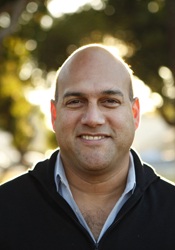Singularity University Blog | The New York Times explained — our singular purpose
June 13, 2010
Singularity University Blog — June 12, 2010 | Salim Ismael
 We were pleased to see a long article featuring Singularity University appeared in today’s New York Times titled “Merely Human? That’s So Yesterday.” While factually accurate, the narrow focus of the article may lead readers away from the core goal of our program, which is to leverage accelerating technologies to address global issues. It’s our focus on these global Grand Challenges that has attracted such a world-class faculty and applicants from 85 countries to apply to attend, and we thought it appropriate to explain this in more detail than the scope of the article presented.
We were pleased to see a long article featuring Singularity University appeared in today’s New York Times titled “Merely Human? That’s So Yesterday.” While factually accurate, the narrow focus of the article may lead readers away from the core goal of our program, which is to leverage accelerating technologies to address global issues. It’s our focus on these global Grand Challenges that has attracted such a world-class faculty and applicants from 85 countries to apply to attend, and we thought it appropriate to explain this in more detail than the scope of the article presented.
We certainly agree with the acceleration in technology and the enormous impacts they continue to have on our lives. But the major benefits also come with major costs and risks — the oil disaster in the Gulf is a clear example of that. It’s also clear that many people around the world — including policy makers or business leaders — would like a better handle on the dramatic impact rapidly advancing technologies have on society. The impact of the financial crisis, itself rooted in accelerating factors, is a further example.
We work to bring together students from around the world and from a wide variety of backgrounds: they are researchers and teachers, NGO workers and social and business entrepreneurs. Next Saturday, 80 students from 35 countries will start a 10-week intensive Graduate Studies Program that is the heart of Singularity University.
In Week One, we’ll bring together global experts in our grand challenges to examine the characteristics of home energy, clean water, the future of food production, and upcycling of consumer waste. They’ll learn what’s been tried, what’s worked, and what’s failed in these areas. After that, they’ll spend half the program getting unique interdisciplinary views of accelerating technologies — including the state of the art and what might be possible in the next decade. The second half is spent entirely on a set of team projects leveraging these technologies and working on products and services that can help people address them. The four team projects from our inaugural summer are a great testament to our approach.
Our curriculum spends significant time on the risks of these accelerating technologies as well as the benefits. We logically conclude it is probable that these technologies are coming, whether people like them or not, and it’s quite important to try to study them and their consequences, both good and bad. Some may see optimistic projections as wishful thinking, and indeed there are those who believe in a better future simply because they like the idea. But even if one assigns a low probability to the world changing events and technologies we study in our sessions, the effects are so dramatic that it would be an error not to have a place to study them.
Mr. Kurzweil has often stated that war is a very expensive method of human development, while technology has been an extraordinarily powerful and inexpensive method. We at Singularity University agree: our view is that these accelerating technologies can actually scale to meet the needs of our Grand Challenges.
Salim Ismail
CEO & Executive Director
Singularity University
